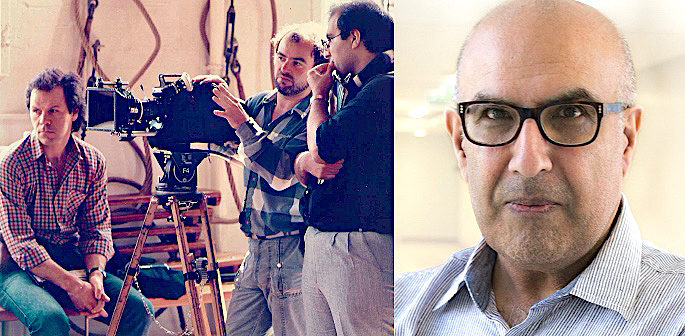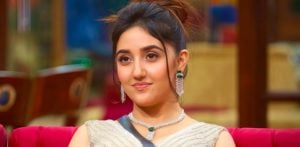"It was the real seat of the pants TV."
Award-winning Broadcaster, Author and Strategic Communications Consultant Waseem Mahmood remains one of the youngest producers credited on BBC television.
Waseem wonderfully and magically continued the fantastic work of greats such as Mahinder Kaul and Saleem Shahid after the Asian Unit came into existence in 1965.
Many will remember the Unit’s earlier programmes such as Apna Hi Ghar Samajhiye (Make Yourself at Home: 1965) and Nai Zindagi Naya Jeevan (New Life, New Life: 1968).
At the age of 21, Waseem Mahmood began his media career in the early 80s. During his eight years working for the BBC, Waseem was based at Pebble Mill – the forefront of innovation.
Leading on a wide range of programming genres, the influential Waseem Mahmood went onto produce and direct major shows for the Beeb’s Asian Unit including Gharbhar (1977), Asian Magazine (1982), and Network East (1987).
The launch of the Asian Magazine saw a group of multi-lingual creatives and presenters from all backgrounds coming together to produce it.
Led by Executive Producer Ashok Rampal, Waseem was fortunate to work with the likes of stalwarts Krishen Gould, Bish Mehay and Yousuf Aziz.
Presenters on the show were Azmat Bajwa, Rashid Ashraf, Parveen Mirza, Lalita Ahmed, Chaman Lal Chaman and Iftikar Arif to name a few.
Having no rigid structure, Asian Magazine gave the youth a platform for discussions on, racism, culture and identity.
Meanwhile, the programme was continuously showcasing interviews with the very best from the world of entertainment, music and sports.
Famous personalities on the Asian Magazine included Amitabh Bachchan, Asha Bhosle, Imran Khan, Kishore Kumar (late), Lata Mangeshkar, Rekha, DCS, Nazia Hassan (late), Zohaib Hassan and others.
Watch the BBC Interview with Imran Khan produced by Waseem Mahmood here:

Asian Magazine became a crossing bridge between British-born generations and their South Asian parents in understanding one another.
Despite each generation having their own identity, they did have an attachment with their South Asian links. Thus, this programme had an instant appeal to the British Asian lifestyle and was an enjoyable living room TV watch.
Asian Magazine went on air at 10:00 am every Saturday morning. Concurrent to the Asian Magazine, Waseem was producing the women’s weekly programme Gharbhar. He then briefly had responsibility on Network East.
Additionally, Waseem contributed to the Golden Oldies Picture Show (1985), which Dave Lee Travis introduced.
In an exclusive Q&A with DESIblitz, Waseem Mahmood discusses his media entry, the journey with British television and future thoughts.

Coming from a journalistic family, how did you uncover your media destiny?
I think that journalism was always omnipresent in the house while I was growing up. Something that I was very conscious of.
Both my parents were journalists. My father was one of the pioneers of Urdu journalism in the UK. He had worked on a number of newspapers before switching to the local English language press.
As far as I can remember the house used to be filled with journalists, writers, politicians and stars from the sub-continent. Most of them used to stay with us when they visited the UK.
“More than one political plot must have been hatched in our front room in Selly Park!”
Growing up, I used to help my parents with a women’s magazine that they launched.
So, every month, we’d have to physically collate the pages together once they came back from the printer and staple them before delivering them to the shops around the Midlands.
I think that I never really thought of myself as a journalist but was more inclined to the creative arts. My degree in university was actually drama where I studied acting before I switched to directing.
I was also pretty interested in photography and always thought my future lay in the visual arts as opposed to following in the family business so to say.
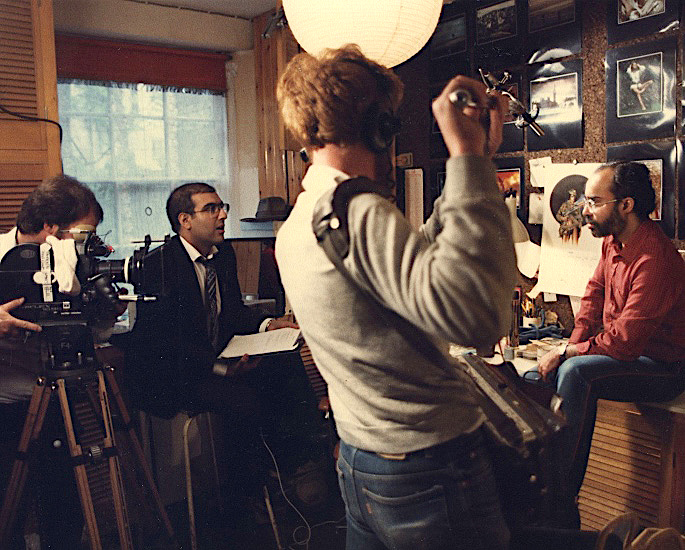
How did you get a foot into the BBC and what was the process?
This may sound pompous but in hindsight, it was incredibly easy. I had finished the first year of my degree and was on the summer break. The job of the producer at BBC’s Asian Unit appeared in the Evening Mail.
BBC jobs were hardly advertised externally expect for a few entry-level jobs that would be in the Media Guardian.
My friend, John Murray pointed this out to me and pushed me into applying. I never for one minute thought that I would have a chance at getting in at that level at 21.
However, I went ahead if nothing else to get an experience of filling out a BBC application. I then got boarded, I remember I was still sure that I would not get it.
I recall that I did not wear a suit, but went with black cords, black shirt and a cream blazer. Please don’t judge my sartorial choices, it was the eighties after all!
I guess that knowing I had no chance in hell of the job freed me to tell it as it was.
“I thought that I would never again get the chance to have my say in front of so many BBC big wigs.”
My plan was to tell them what I thought of the programming. I must have said something right because three weeks later the call came to tell me I’d got the job.”
Even when BBC rang, when they asked to speak to Mr Mahmood I handed it to my father. I thought they wanted him for a comment on something as they often did.
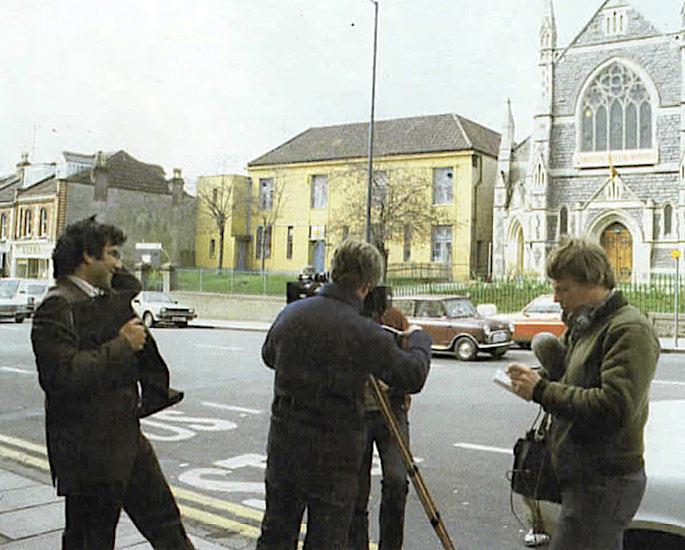
What were the responsibilities and challenges of a producer in the 80s?
In those days a producer’s job was very different from what it is now. I would originate the ideas, once my boss the Executive Producer – Ashok Rampal had approved.
I’d then research the ideas, write the brief for the presenters if I was not doing it myself. I would also shoot the inserts, edit them, write the studio links and direct the gallery.
Additionally, I would translate the Urdu/Hindi into English and write the subtitles. I would be the last person to sign off on the show before it was sent to London for transmission.
“It was the real seat of the pants TV. I am literally perplexed by all the different sorts of producers that work on a show now.”
I have no idea how “production by committee” gets anything done. In my day, I knew where the buck stopped – with me!
An interesting story, was that whenever you’d go out into the community and tell them that you produced the Sunday Morning BBC show, the first question most would ask was, “So what do you do for the rest of the week?”
“Half of the community was convinced that I ran a take-away on Ladypool road.”
In terms of challenges, I guess that my job was to try and make the show more relevant to the younger audiences and cover issues that would matter to them.
Also with the programming we did being the only Asian programming on mainstream BBC channels I was always conscious of the responsibility I carried and the high expectations that the audiences had from us.
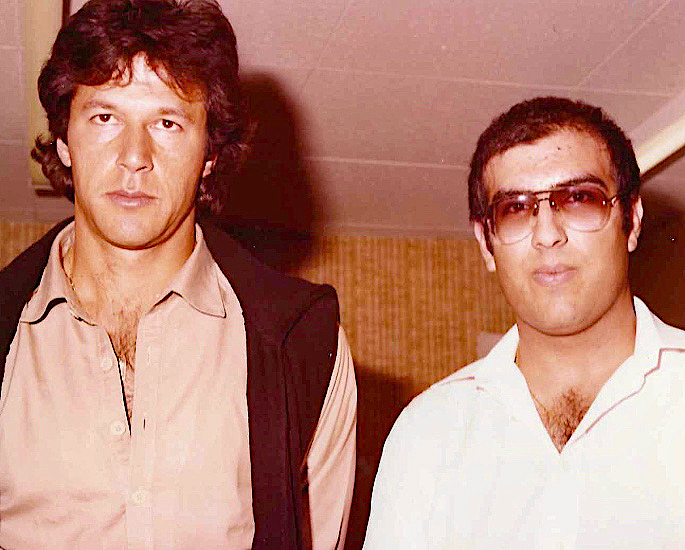
What are your best memories of producing Asian Magazine?
In the nine or so years I was at the BBC, it is really difficult to pinpoint highlights. In addition, a lot of memories have faded with time.
Nevertheless, those that stand out include Imran Khan for his first BBC interview, listening to Asha Bhosle rehearse ‘In Ankhon Ki Masti’ without music, “discovering” Meera Syal in her last year at Manchester University and doing her first TV interview.
I can also recollect doing my first 30 minute documentary about Safira Afzal, the first Pakistani model and Bond girl, getting my programme on Ravi Shankar on a prime time BBC2 slot and interviewing former Pakistani Prime Minister Muhammad Khan Junejo.
In the eighties, we were the only gig in town. Thus, all the Bollywood, Indian/Pakistani sports and other personalities would have come on our show at one time or another.
We also managed to get a lot of royalty and British politicians on the show as well. It fell on me to interview HRH Prince Philip about his Duke of Edinburgh award.
I recall I was very nervous and decided to visit the washroom before the recording. While I am at the urinal, a tall man comes in next to me.
He greets me and looks familiar. It takes a few seconds for it to register that its HRH himself!
“Certainly broke the ice and made the interview easier.”
Achievements are difficult to quantify. I would say that sometimes getting a show to air on time was in itself the biggest achievement.
No – actually getting one presenter who will remain nameless to turn up to a shoot or on location on time was a major achievement.
In the end knowing that he would be up to an hour late no matter what call time we gave him, my PA and I started giving him a call time one hour earlier than we needed him.
However, he would still be late but in time for when we needed him.
Watch the 1986 BBC Interview directed by Waseem Mahmood with Rekha here:

Tell us a little about your contribution to Golden Oldies and Network East?
The “Golden Oldies Picture show” was a show that was produced at Pebble Mill. It went out on BBC One at 7.30 on a Wednesday.
The idea was that the “bright young directors” of the BBC would be invited to make a “video” for a song that didn’t have a “video” when it was released.
So in the age of multi-million-pound videos like “Thriller”, we were packed off with three days shooting, two weeks editing and would you believe one grand as a budget!
Oh and to add to it – we were not allowed to have the original artiste to appear and lipsync.
In spite of all this, we did a decent job, and were pulling in audiences of over 9 million! I directed “Seasons in the Sun” by Terry Jacks and “Nights in White Satin” Moody Blues.
Network East was the show that took over from the Asian Magazine.
“The BBC thought that it wanted to change the mandate from making shows “for” Asians to shows “about” Asians.”
So we ended up with a peppy fast-moving show in English. I actually dreamt up the name “Network East.”
We had to pass the telephone test so we’d sit there picking up the phone trying different names. I did the first few shows and then moved onto another department.

Being a pioneer from The Asian Unit, how does that make you feel?
I only think of myself as a pioneer in that I was one of the first few Asians who worked in television and produced a regular programme on mainstream BBC One before anyone else.
However, the people I worked with Ashok Rampal, Krishen Gould, Bish Mehay and Yousuf Aziz were the real trailblazers and the pioneers in the true sense of the word.
“I am dismayed that their contribution to the industry has been lost in the mists of time.”
All of us in media today owe them a huge debt of gratitude. They led the way, opened the doors for us all to barge through.
The Sunday morning show on BBC was a national institution. I am privileged to have been a part of it.

What are your thoughts on representation and diversity across the UK?
We all know that there is a huge ongoing debate about the issues of diversity and inclusivity in the entertainment industry.
The events around the whole Black Lives Matter have highlighted how important a role that representation has in shaping people’s perception of the “other.”
I learn that many films deemed to be racist are being withdrawn. Literally today HBO Max withdrew the classic, “Gone with the Wind” from its service.
The question I have is will they also now withdraw, “Homeland”, “24”, “The Brink” and all the other films and television programmes where they have misrepresented Muslims in particular over the last couple of decades?
The other thing that I guess I would say is that issues of racism, identity and community cohesion are still the same as they were 35 years ago when I was doing programmes about these very same issues.
I watched several discussions I recorded in those days and honestly, you could play them on TV today and barring the hairstyles and fashions they would not be out of place in the issues they cover.
“We have not moved on at all and that is a frightening prospect.”

What are your future plans?
While it is important that mainstream media is seen to be more diverse and inclusive we feel that it is also equally incumbent on us as minorities to be telling our own stories to a mainstream audience.
The success of films like “The Big Sick” “Crazy Rich Asians” and “Parasite” have shown that mainstream is ready to embrace culturally diverse movies.
Having watched what has been happening over the past few years, I have come together with likeminded media professionals with the aim of highlighting positive narratives from underrepresented communities that have crossover mainstream appeal.
What has been important is that the stories we chose to tell are universal and not “preachy” or with any political agenda.
DESIblitz was the first to talk about “Good Morning Afghanistan” the film based on my experiences in Kabul. This film is in development at the moment. We also have a slate of projects that we hope – all being well – will be going into production in 2020.
I am also very keen to connect with talented BAME people who might have stories to tell or talented BAME industry professionals.
For example, a particular story I am working on I was very keen to use a Muslim writer and for the life of me could not find one who had the experience to be able to write a feature and attract funding.
“I would love people to reach out, connect with me and we’ll see what we can do to change this mindset.”
Waseem who was also producing for radio had a brief stint working on the BBC farming programme. He left the BBC to set up TV Asia, the first satellite channel, catering to the British Asian community.
Post-TV Asia, Waseem Mahmood worked on several media and international development assignments.
His projects covered Afghanistan, Jordan, Kenya, Vietnam, Pakistan, Iraq, Nigeria, Bosnia, Kosovo Lebanon Syria, Nepal, Sri Lanka and the Maldives.
In 2005, Waseem Mahmood was honoured with an OBE for services to the reconstruction of media in post-war countries.
Despite many achievements, his humble beginnings will always be special for him. It is evident that the eighties was a great period for the BBC.
The public service broadcaster was riding high and really respected around the world for its programming during those days. For Waseem Mahmood, it was great to be part of that wave.




















































